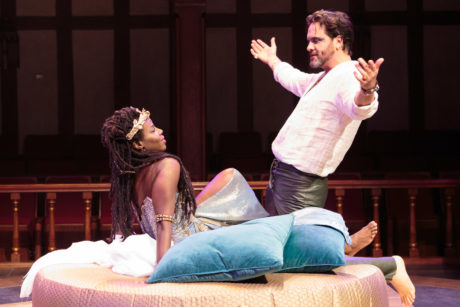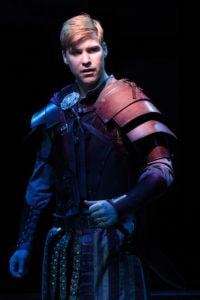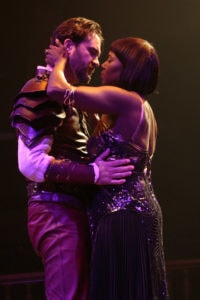All for Love
Noted critic Harold Bloom once said, “We certainly can say that Cleopatra and Antony do not bore each other, and they are bored, erotically and otherwise, by everyone else in their world.” As characters, they are expansive and endlessly interesting. Director Robert Richmond’s production focuses on the love affair between these two rather than the power dynamics which ultimately overwhelm them. They are always contemporary and relevant, as archetypes of the collision between politics and passion.
David Siegel interviews Antony and Cleopatra lighting designer Andrew F. Griffin here
The Folger’s Antony and Cleopatra is visually sumptuous, with costumes, lights, and movement coming together to provide indulgence for the senses. The play is known for its multiplicity of short scenes, magnificent poetry, and predominant adherence to Plutarch’s Life of Antony. And it is, of course, one of the greatest love stories of all time. First-rate acting and imaginative directing choices combine to make an exhilarating evening in the theatre.

Cody Nickell’s Antony is so enraptured by Cleopatra at first that he seems barely aware of what is going on around him. His performance builds slowly, and as he reaches the point of mind-numbing desperation, he takes us all with him. As a character, Antony seems to attract people who play games. Enobarbus and Cleopatra both play games with him. Antony tires of it, though, and when in trouble wants to hear the truth. The death of his wife, Fulvia, leads to a wistful soliloquy about how we only appreciate others when they are gone.
Shirine Babb’s Cleopatra is queenly, coy, and ferocious by turns. She sweeps in like an empress, in glistening gowns, and proceeds to give a richly layered performance. Babb has a sure grasp of Cleopatra’s authority, and love of playing roles. Her Cleopatra is also insecure, continually anxious about her possible rivals for Antony’s love. When in doubt, she rewards those who tell her what she wants to hear.

As Octavius Caesar, Dylan Paul is appropriately young, heartless, and efficient. His warm relationship with his sister Octavia (Nicole King) is the only trace of a chink in his armor. At first, he settles his disagreements with Antony. The Triumvirate of Caesar, Lepidus and Antony will continue to rule the Roman world. But then Antony makes a critical mistake. Frustrated, perhaps, with Cleopatra’s relentless game playing, he promises to marry Caesar’s sister, Octavia. This leads to a chain of events which results in war.
Mutual obsession is the heart of this production, and the kind of skewed decisions people make in the wake of such obsessions. The political aspects of the plot are somewhat less prominent, due to the excision of Pompey and some other characters who figure crucially in the struggle for power. Still, the focus here is the impact of their private relationship on the fortunes of the empire. The stage pictures are entrancing, and are enhanced by the commitment of the actors.

A particularly fine scene occurs between Enobarbus (Nigel Gore) and Agrippa (Chris Genebach) as they marvel at Cleopatra’s ageless appeal and its coup-de-foudre-like effect on Antony. Another highlight is Antony’s exchange with the Soothsayer (Anthony Michael Martinez), when he is warned that Caesar is an existential danger to him. Robbie Gay plays both Lepidus, the member of the Triumvirate whom no one takes seriously, and Dolabella, who gets a little too close to Cleopatra. As Lepidus, he excels in the famous drinking scene. As Dolabella, his best moments come when he reluctantly tells Cleopatra of her likely future without Antony.
Cleopatra’s circle consists of handmaids Charmian (Simoné Elizabeth Bart), Iras (Nicole King), and eunuch Mardian (John Floyd). The women begin with giggles and a sorority-like sense of fun, as they ask the Soothsayer Martinez about their futures. They ignore his equivocation, but become more and more somber as Cleopatra’s situation worsens. Floyd’s Mardian has some nicely comic moments when asked if, as a eunuch, he still has romantic feelings. As Iras, one of Cleopatra’s handmaidens, and Octavia, Antony’s unsuspecting bride, Nicole King gives an assured performance, although I was somewhat confused as to why the sedate Octavia was included in the drinking scene. As Charmian, Bart handles the transitions well as she attempts to keep up with Cleopatra’s lightning changes of mood.
Andrew F. Griffin’s lighting was especially lovely. Mariah Hale’s costumes are spectacular, among the best I have seen. Tony Cisek’s set design ingeniously makes the most of the Folger stage. Adam Stamper’s Music Composition and Set Design augment the impressive work of this beautifully detailed production.

Antony’s final scene with Eros (Anthony Michael Martinez) is deeply moving. In the end Antony is determined to die ‘like a Roman.” Cleopatra, who has been focused almost exclusively on Antony throughout, is more concerned about whether she will be the first to kiss him in the afterlife.
It is difficult not to conclude that Antony and Cleopatra were destined to fall in love and ultimately drive each other crazy. It is spellbinding to watch them destroy each other, although Caesar probably would have gotten rid of them anyway. And their story is an irresistible reminder of the contradictions of passionate love.
Running Time: Approximately two hours, with a 15-minute intermission.
Antony and Cleopatra plays through June 11, 2017, at Folger Theatre – 201 East Capitol Street, SE, in Washington, DC. For tickets, call the box office at (202) 544-7077, or purchase them online.





